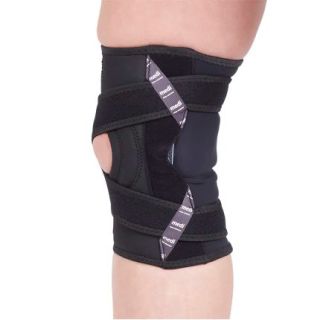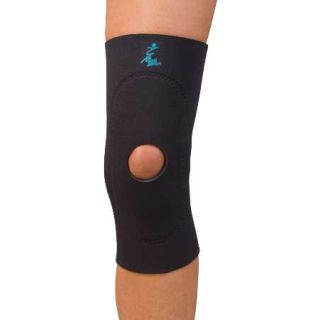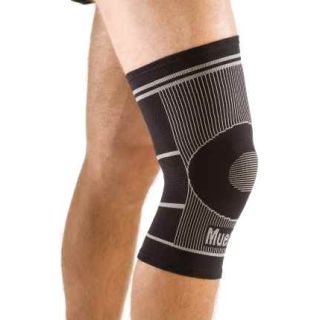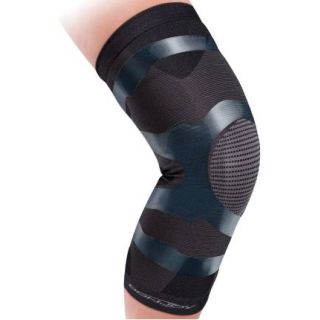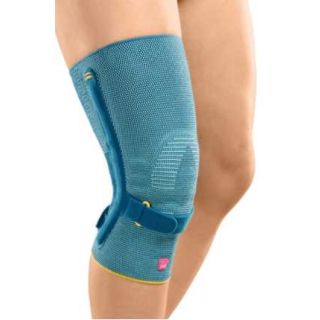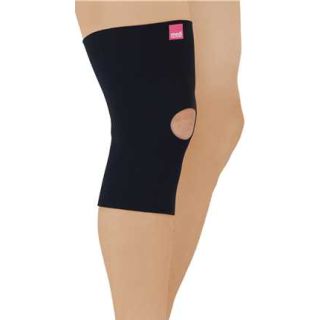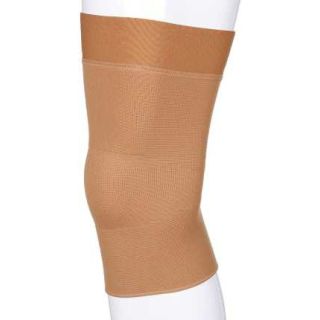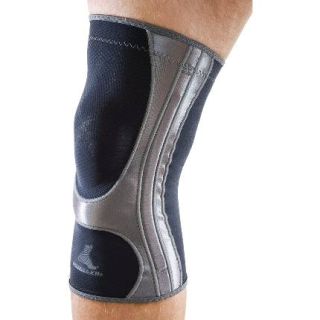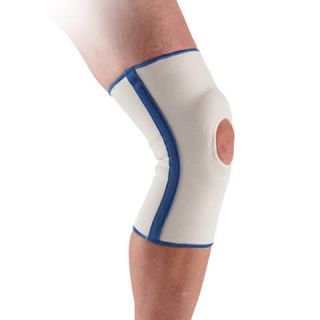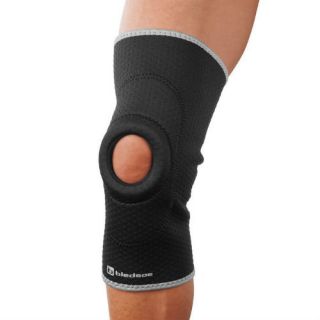Knee sleeves are supportive, elasticized pieces of fabric worn around the knees, designed to provide compression, stability, and warmth to the joint during exercise or physical activity. Unlike knee braces, which are typically used for rehabilitative purposes following an injury, knee sleeves are more preventative in nature. They do not restrict movement but instead offer a balance between support and mobility, which is crucial for athletes who require flexibility and freedom in their performance.
Typically made from materials such as neoprene, nylon, and spandex, knee sleeves are lightweight, durable, and easy to slip on and off. They come in various thicknesses and sizes, catering to different levels of activity, types of support, and personal preferences.
The Benefits of Knee Sleeves
Knee sleeves provide numerous benefits that contribute to both performance and long-term joint health. The primary advantages include joint stability, injury prevention, and improved recovery.
1. Joint Stability and Alignment
One of the main purposes of a knee sleeve is to improve joint stability by providing consistent compression around the knee. The knee joint is particularly prone to lateral (side-to-side) movement, which can cause wear and tear on ligaments like the anterior cruciate ligament (ACL) or medial collateral ligament (MCL). Knee sleeves help to keep the knee in proper alignment during movements such as squats, lunges, or jumping, which reduces the risk of strains and sprains.
By compressing the joint, the sleeve increases proprioception, which is the body's awareness of its position and movements. Enhanced proprioception helps athletes better control their knee movements, particularly during complex exercises that require balance and coordination. This improved control can lead to better form and technique, reducing the risk of injury from poor mechanics.
2. Injury Prevention
Knee injuries, particularly in high-impact or repetitive activities, are common. Athletes who engage in sports such as weightlifting, running, basketball, or CrossFit are especially at risk of knee issues, such as tendinitis, meniscus tears, or ligament damage. Knee sleeves provide a layer of protection by reducing the stress placed on the knee joint.
The compression provided by knee sleeves helps limit excessive movement that could lead to hyperextension or joint instability. Additionally, they create a warming effect around the joint, which increases blood flow and helps keep the joint and surrounding muscles warm when recovering from an injury. This warming effect reduces stiffness and enhances flexibility, lowering the likelihood of muscle strains or joint stiffness that can contribute to injuries.
3. Pain Reduction and Improved Recovery
Many athletes experience knee pain during or after physical activity, often due to inflammation or overuse. Knee sleeves offer pain relief by compressing the joint, which helps to reduce swelling and inflammation. The compression also supports the knee's surrounding muscles and ligaments, providing a sense of stability that can alleviate discomfort.
Moreover, knee sleeves assist in post-exercise recovery by increasing blood circulation around the knee. Enhanced circulation promotes faster removal of metabolic waste products (such as lactic acid) that build up during intense exercise, aiding in quicker recovery and reducing the likelihood of delayed onset muscle soreness (DOMS).
4. Enhanced Performance
For athletes, wearing knee sleeves isn't just about preventing injury; it can also enhance performance. The added knee support and confidence provided by knee sleeves allow athletes to push themselves further, especially during heavy lifting exercises like squats and deadlifts. The compression and warmth can make movements feel smoother and more controlled, enabling individuals to perform at their best without being hindered by joint discomfort or instability.
Compression sleeves are particularly useful in strength sports like powerlifting or bodybuilding, where joint stability and support during heavy lifts can make a significant difference in both performance and long-term health.
How to Choose the Right Knee Sleeve
Choosing the right knee sleeve depends on several factors, including the type of activity you engage in, your specific needs, and your personal preferences. To make the best decision, it's essential to consider the following key factors:
1. Material
Knee sleeves are made from different materials, each offering varying levels of comfort, flexibility, and support. The most common material used in knee sleeves is neoprene, a synthetic rubber known for its durability, flexibility, and ability to retain heat. Neoprene sleeves provide excellent compression and warmth, making them ideal for heavy lifting or high-impact activities. However, some athletes prefer sleeves made from more breathable materials like nylon or spandex for lighter activities like running, yoga, or cycling, where heat retention is less critical.
If comfort and breathability are important to you, opt for a sleeve made from a blend of neoprene and other lightweight materials. These options offer a balance between support and breathability without sacrificing durability.
2. Thickness
Knee sleeves are available in various thicknesses, typically ranging from 3mm to 7mm. The thickness you choose will depend on the level of support you need and the type of activity you perform.
3mm: These thin sleeves are best suited for endurance activities like running, cycling, or aerobic exercises. They offer a light level of support and compression, allowing for maximum flexibility and mobility while still providing some stability to the knee joint. If your primary goal is to keep the joint warm and improve circulation during low-impact activities, a 3mm sleeve is a good choice.
5mm: This thickness is a middle ground and provides moderate support. It is versatile and can be used for both endurance and strength-based activities. If you're engaged in a mix of cardio and weight training, or you need more support than a 3mm sleeve offers but don’t want to sacrifice too much mobility, a 5mm knee sleeve is ideal.
7mm: The thickest knee sleeves, at 7mm thick, are designed for maximum support during heavy lifting, powerlifting, or strongman training. These sleeves offer substantial compression and stability, which is essential for reducing strain on the knees during squats, deadlifts, or other strength-based exercises that place significant pressure on the joint.
3. Size and Fit
Proper sizing is critical when selecting a knee sleeve. A sleeve that is too tight can restrict blood flow and cause discomfort, while a sleeve that is too loose won’t provide the necessary support. Most knee sleeve manufacturers provide sizing charts based on the circumference of your knee or calf, so it's important to measure yourself accurately.
When trying on a knee sleeve, it should feel snug but not overly constrictive. If you're primarily using the sleeve for heavy lifting, you may want a slightly tighter fit for additional support. However, if you're using it for more general activities like running or cycling, a looser fit that allows more freedom of movement may be preferable.
4. Design and Features
Some knee sleeves come with additional design features that enhance functionality and comfort. For example, some sleeves have reinforced stitching or silicone strips along the inside to prevent the sleeve from slipping during activity. Others are designed with anatomical shapes to better conform to the natural curves of the knee, offering a more customized fit.
Additionally, some athletes prefer open-patella designs, which leave the kneecap exposed to reduce pressure on the front of the knee. This can be particularly beneficial for people with patellar tendinitis or other kneecap-related issues.
5. Purpose
The intended purpose of the knee sleeve is another critical factor. If you’re recovering from a knee injury or have chronic knee pain, a more supportive, thicker sleeve may be necessary. For injury prevention or general joint stability, a medium-thickness sleeve could suffice. Keep in mind that while knee sleeves provide support, they should not be relied upon to compensate for poor form, lack of mobility, or an underlying injury. If you have significant knee issues, it's essential to consult a healthcare professional before using a sleeve.
 Details$87.99 $73.99
Details$87.99 $73.99 Details$32.99 $25.99
Details$32.99 $25.99 Details$22.99 $16.99
Details$22.99 $16.99 Details$63.99 $50.29
Details$63.99 $50.29 Details$93.99 $84.99
Details$93.99 $84.99 Details$120.00 $79.99
Details$120.00 $79.99 Details$35.00 $28.00
Details$35.00 $28.00 Details$35.99 $28.00
Details$35.99 $28.00 Details$28.99 $20.99
Details$28.99 $20.99 Details$36.99 $33.99
Details$36.99 $33.99 Details$39.99 $34.99
Details$39.99 $34.99

